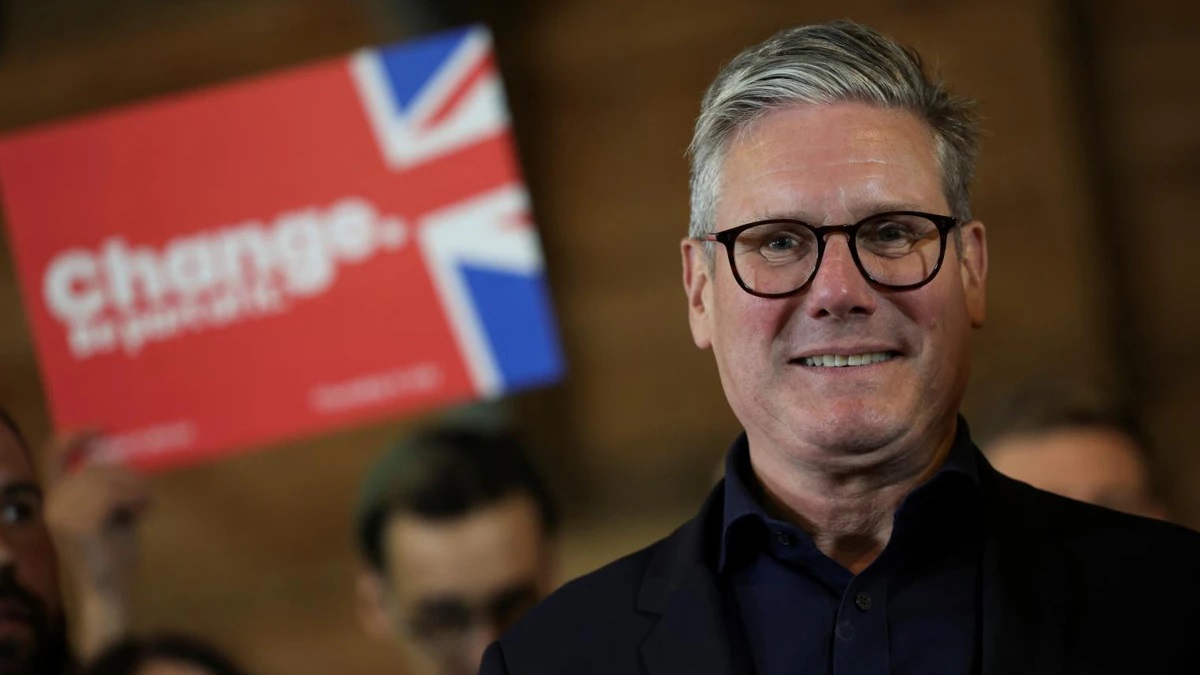
On July 4, elections were held in the United Kingdom, which includes the territories of Scotland, Wales, England and Northern Ireland, which determine the composition of the Westminster Parliament and who will be the next prime minister.
Labour won a landslide victory, winning 412 seats, 214 more than in the 2019 election, ending fourteen years of Conservative rule, which saw them win 121 seats, 251 fewer than in 2019, and making it one of the worst elections in their history.

Behind them are the Liberal Democrats with 71 seats (63 more than in the last election) and the Scottish National Party (SNP) with 9 seats.
On Friday morning, King Charles III asked the Labour leader, Keir Starmer, to form a government as the new Prime Minister of the United Kingdom. This was after holding an audience at Buckingham Palace, the official residence of the Crown in London.
With 412 seats, Stramer and Labour have a secure majority in the House of Commons, the UK’s main legislative body, along with the unelected House of Lords.
The House of Commons is made up of 650 members, each of whom is elected by a geographical constituency of roughly equal population, which was the case in Thursday’s election.
In each constituency, the candidate with the most votes wins. It is not necessary to obtain 50% of the votes, and the votes of other candidates are effectively lost. This is known as majority voting.
The House of Commons also elects the prime minister. By convention, the monarch invites the leader of the party with the most votes to form a government, which is what happened on Friday morning. The future prime minister must have the support of a majority of MPs, which is ruled out by the very good election of the Labour Party.
Technically, a majority in the House of Commons requires 326 MPs (half of all seats plus one), well below the seats obtained by Labour, which has a comfortable and large majority to govern.
Unpopular leaders and 14 years of conservative governments
Although Labour swept this election, it was a contest in which The main parties and their leaders were more unpopular than in any previous contest.
Labour’s victory is not surprising, of course, After 14 catastrophic years under conservative governmentsresponsible for Brexit, technical recession and inflation, tripling of university fees, dismantling of the National Health System (NHS), the scandals surrounding the partygates during confinement and cases of corruption in the purchase of personal protective equipment (PPE) in the midst of the pandemic.
Furthermore, as a result of the fierce attack on the working conditions and living standards of the working class, There was a desire to remove the Tories from governmentOn July 4, millions of people went to the polls feeling the loss of wages, tired of waiting lists at record levels to be served and with schools and universities on the verge of collapse.
Let us also remember that Rishi Sunak, the Conservative Prime Minister until today, was not elected, but installed after a rebellion abruptly ended Liz Truss’s cabinet. Labour contender Keir Starmer has led the party through a left-wing purge, which saw the Jeremy Corbyn’s expulsionafter announcing he would stand as an independent candidate in Islington North in the general election after Keir Starmer banned him from standing for Labour for claiming the extent of antisemitism in the party was “dramatically exaggerated”.
During the election campaign, the leaders of the Conservative and Labour Parties They refused to talk about the attacks on the Palestinian people, in open contrast to what was being expressed on the streets. when hundreds of thousands of people were actively demonstrating their opposition to the genocide of the Palestinian people and calling for a ceasefire. This movement reached its peak on 11 November 2023 when the largest pro-Palestine demonstration took place, which, according to the Palestine Solidarity Campaign, was attended by 800.000 personas.
This massive movement has also had its effect on the national elections, as several Labour MPs resigned when Keir Starmer said Israel had the right to defend itself and refused to call for a ceasefireThose who did not align themselves with this narrative are standing as independents in several constituencies, including Jeremy Corbyn, who won by standing outside the traditional parties, defeating the Labour electoral machine.
Jeremy Corbyn has thus won in Islington North, the district he has represented since 1983, but for the first time he has been elected as an independent MP, and has already announced that he intends to question Starmer if he carries out anti-social policies or attacks health and education, and he also questioned the Labour manifesto for being insufficient.
Starmer’s career
On the other hand, Starmer began the election campaign by insisting on his establishment party credentials“We stopped being a protest party five years ago,” he declared sternly as his aides led a young activist away from the presentation of his manifesto.
A manifesto, we must clarify, abstract and general in which There are no major transformative commitments or a concrete plan to combat poverty in a country where official figures estimate that 4.3 million children (30% of all children in the UK) were living in relatively low-income households after housing costs rose in 2022/23.
Between 1 April 2023 and 31 March 2024, the food banks in the Trussell Trust UK network They distributed more than 3.1 million emergency packages to people in need, an increase of 94% over the past five years. More than 1.1 million of these packages were distributed to children. This is the country that Starmer will inherit, but his moderate election manifesto fails to bring improvements to match the situation.
A new phenomenon in the election campaign has been the eye of Reform UKof which Nigel Farage is a director and majority shareholder and which, he insists, “will become more democratised over time”. Farage was not going to stand as a candidate in his constituency, but the result of the European Parliament elections, where a growth of right-wing populist formations seems to have emboldened him.
Reform UK, del xenophobic, racist and misogynist Nigel Faragewhich appeals to older voters who yearn for Britain’s place in the world – a country that no longer exists – managed to obtain 14% of the vote, in some areas on a par with or slightly ahead of the Conservative Party, although that rise had been stagnating in the last two weeks.
In a provocative move, Nigel Farage has said he is part of a “similar phenomenon” to influential misogynist Andrew Tate, claiming there are forces in society trying to “stop young men from being young men”. The Reform UK leader used the final day of campaigning to speak out about what he described as feelings of “emasculation” among young men. The comments come amid concerns about the rise of role models associated with toxic masculinity.
Despite the victory, the majority of millions of Labour voters are not Starmer supportersThey voted Labour because they want to end low wages and benefits, poor or ruinously expensive housing and a government riddled with corruption.
In a European landscape of rising right-wing populist parties, a Labour victory could be sending a different message. However, what is coming from Keir Starmer’s government will be continuityno transformation, nothing will change. The Labour campaign has been uninspiring, moderate and cautious. Starmer intends to govern without radical changes, without offering any fundamental change or upsetting the right-wing press or the big bankers and businessmen. This is the worst defeat for the conservatives (the worst having been in 1997 when they won 165 seats, and in 1906 when they won 156 seats) and the party of big business, austerity, war, cuts to the NHS, racism and support for Israel. Whether and how they can be put back together remains to be seen.
Source: www.laizquierdadiario.com

